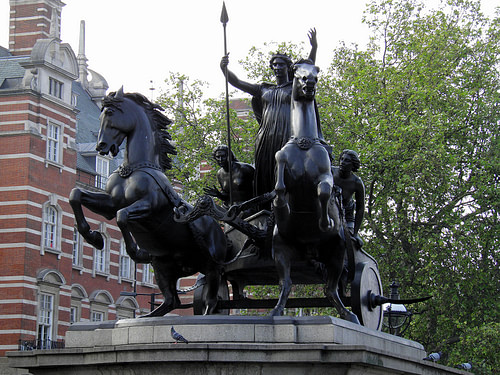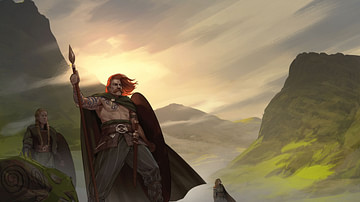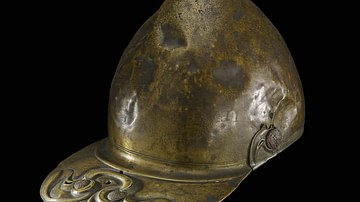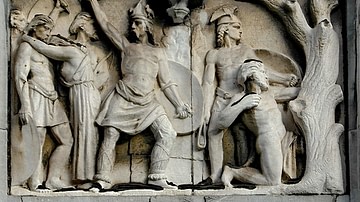
Boudicca (d. 61 CE) was the Celtic queen of the Iceni tribe of modern-day East Anglia, Britain, who led a revolt against Rome in 60/61 CE. The Iceni king, Prasutagus, an independent ally of Rome, divided his estate between his daughters and the Roman emperor Nero (r. 54-68 CE). When Prasutagus died, however, his lands were taken by Rome and the Iceni lost their status as allies.
When his wife, Boudicca, objected to this action she was flogged and her two daughters raped. She mounted a revolt against Rome which left the ancient Roman cities of Camulodunum, Londinium, and Verulamium in ruins and over 80,000 citizens of Roman Britain dead. She was defeated at the Battle of Watling Street by the Roman governor Gaius Suetonius Paulinus (l. 1st century CE) chiefly by his judicious choice of the battlefield and allowing her army to cut off its own escape route by encircling their rear with their wagons, animals, and families. Boudicca is said to have committed suicide by poisoning herself after her defeat.
The Sources
The primary sources of the story of Boudicca's revolt are the Roman historians, Publius Cornelius Tacitus (l. 56-117 CE) and Cassius Dio (l. 150-235 CE). These two offer different versions of the story in that Tacitus claims the revolt sprang from the ill treatment of the Iceni following Prasutagus' death while Dio writes that the cause of the uprising was a dispute over a loan.
The other significant difference in the versions is that Dio makes no mention of the flogging of Boudicca or the rape of her daughters and claims she died of wounds incurred in battle, not by poisoning. Tacitus' account is generally accepted as being more factual because his father-in-law, Gnaeus Julius Agricola (l. 40-93 CE) was the governor in Britain chiefly responsible for the successful conquest of the region and served as Tacitus' primary source of information. There is no doubt of Agricola's participation in the suppression of Boudicca's revolt, serving under Suetonius as a young soldier in 61 CE.
Causes of Boudicca's Rebellion
Tacitus gives his account of the start of the rebellion in his Annals:
Prasutagus, king of the Iceni, after a life of long and renownded prosperity, had made the emperor co-heir with his own two daughters. Prasutagus hoped by this submissiveness to preserve his kingdom and household from attack. But it turned out otherwise. [After his death] kingdom and household alike were plundered like prizes of war, the one by Roman officers, the other by Roman slaves. As a beginning, his widow Boudicca was flogged and their daughters raped. The Icenian chiefs were deprived of their hereditary estates as if the Romans had been given the whole country. The king's own relatives were treated like slaves. And the humiliated Iceni feared still worse, now that they had been reduced to provincial status. So they rebelled. (Lewis, 197)
The historian Miranda Aldhouse-Green cites an earlier Iceni rebellion, in 47 CE, as the cause of Prasutagus' elevation to chief of the tribe. This rebellion was unsuccessful and it is unclear what role Prasutagus played in it but it seems clear that the Romans saw Prasutagus as a leader who could keep the peace between the Iceni and Rome.
Aldhouse-Green also notes the significance of Prasutagus' will, which divided his estate between his daughters and Rome and omitted Boudicca, as evidence of the queen's hostility toward Rome. It is argued that, by leaving her out of the will, Prasutagus hoped his daughters would continue his policy of cooperation. After his death, however, all hope of the Iceni existing peacefully with Rome was lost.
Boudicca's War
Boudicca first struck the city of Camulodunum (modern Colchester) where she massacred the inhabitants and destroyed the settlement. Governor Suetonius was engaged in putting down an uprising on the island of Mona and so the Roman citizens appealed to imperial agent Catus Decianus. He sent a lightly armed force of 200 men who proved ineffective in defense of the city. The Ninth Roman Division, led by Rufus, marched to relieve the settlement but were routed and the infantry decimated by the Briton forces. Tacticus cites the greed and rapacity of men like Catus Decianus for the viciousness of the Britons in revolt.
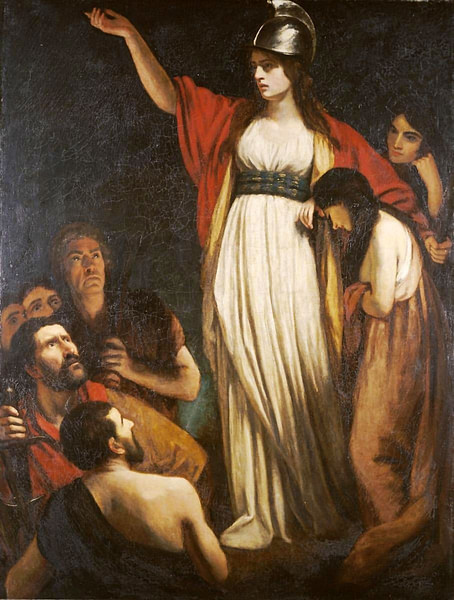
Suetonius, returning from Mona, marched to Londinium (modern London) but, upon receiving intelligence that Boudicca's forces far outnumbered his own, left the city to its fate and sought a field more advantageous for battle. Boudicca's army sacked Londinium and, as before, massacred the inhabitants.
Suetonius had offered the people of the city safe passage with his army and it seems many accepted this offer. However, Tacitus writes, "but those who stayed because they were women, or old, or attached to the place, were slaughtered by the enemy. Verulamium suffered the same fate."
The Battle of Watling Street
While the Britons were destroying Verulamium (modern St. Albans) Suetonius "chose a position in a defile with a wood behind him. There could be no enemy, he knew, except at his front, where there was open country without cover for ambushes" (Tacitus). The Britons arrived to battle in "unprecedented numbers. Their confidence was such that they brought their wives with them to see the victory, installing them in carts stationed at the edge of the battlefield"(Tacitus).
Both leaders are said to have encouraged and inspired their troops and then Suetonius gave the signal for battle and the infantry moved forward to throw their javelins. Boudicca's superior numbers were of no advantage in the narrow field Suetonius had chosen and, in fact, worked against her as the mass of men pushed together provided easy marks for the Romans.
The Britons fell back before the javelin assault and then the advancing wedge formation which cut through their ranks. Suetonius ordered in his auxiliary infantry and then his cavalry and the Britons turned to flee the field. The supply train they had arranged at their rear prevented their escape and the rout turned into a massacre.
Tacitus writes, "the remaining Britons fled with difficulty since their ring of wagons blocked the outlets. The Romans did not spare even the women. Baggage animals too, transfixed with weapons, added to the heaps of dead." Boudicca and her daughters apparently managed to escape but, soon after, poisoned themselves to escape capture.
While the site of the battle is unknown, it is referred to as The Battle of Watling Street and suggestions as to precise location range from King's Cross, London to Church Stowe, Northamptonshire. Following Boudicca's defeat, Suetonius instituted harsher laws on the indigenous people of Britain until he was replaced by Publius Petronius Turpilianus who further secured the south of the region for Rome through gentler measures.
Other, smaller, insurrections were mounted in the years following Boudicca's revolt but none gained the same widespread support nor cost as many lives. The Romans would continue to hold Britain, without any further significant trouble, until their withdrawal from the region in 410 CE. Though she lost her battle and her cause, Boudicca is celebrated today as a national heroine and a universal symbol of the human desire for freedom and justice.
